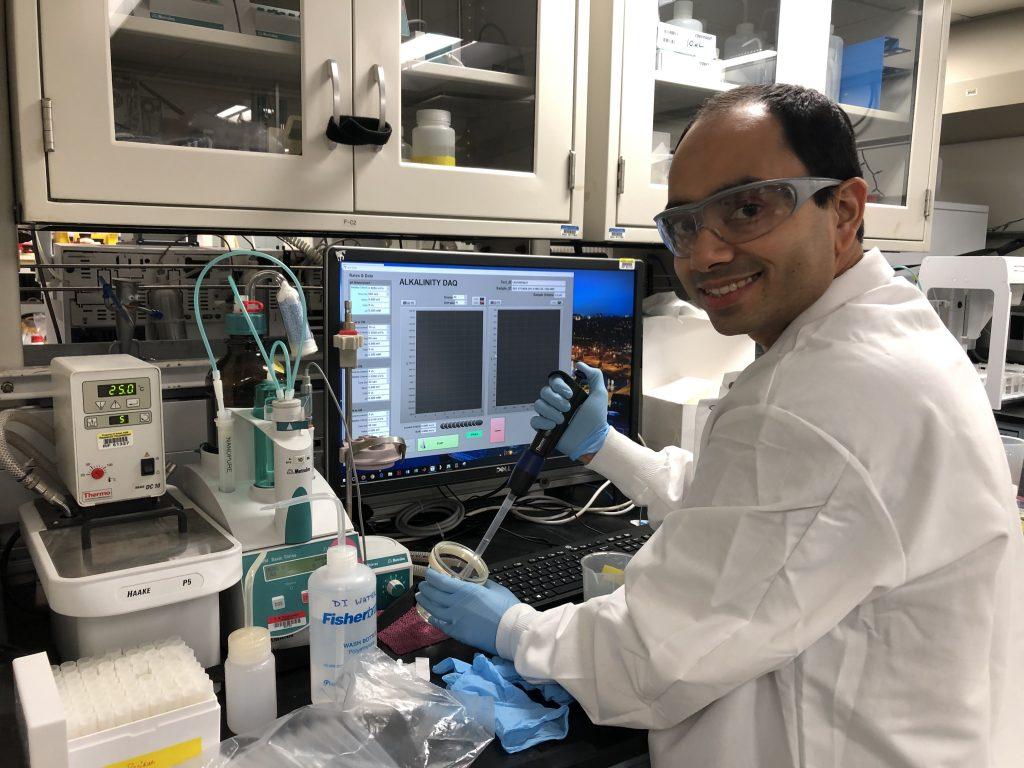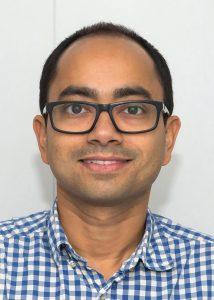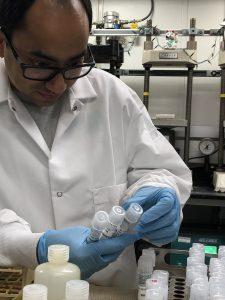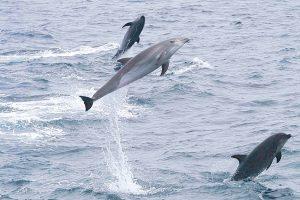
Career Spotlight: Inorganic Geochemist Chandranath Basak

Chandranath Basak Interview
Please describe your job duties while on the JR. What will you be doing on a daily basis?
-
-
-
-
-
-
-
-
- My primary duties onboard JR will be to collect interstitial waters from drilled cores and analyze various cations and anions. I will also be analyzing bulk sediments to measure different elemental concentrations. This data will inform us about the chemical constituents of the pore water and the sediments that will be recovered at each of the proposed sites during the expedition.
-
-
-
-
-
-
-
Describe one instrument or tool that is essential for you to do your job? Or a piece of equipment on the JR that is useful and why – what does it do?
-
-
-
-
-
-
-
-
- One instrument that is essential for my shipboard duty is the Inductively Coupled Plasma Optical Emission Spectrometer (ICP-OES). This machine can measure concentration of elements in solution.
-
-
-
-
-
-
-
Why is your work (or research) important? What question are you trying to answer or how does your work/research help assist/advance scientific knowledge?
- One of my primary research interests is to study past deep ocean circulation changes during periods of Earth’s climate, when it was colder or warmer than today. Deep Ocean circulation is an important component of the Earth’s climate system because it is responsible for transporting dissolved gases, heat, carbon, and nutrients from one part of the ocean to another. What happens when this transport mechanism is perturbed is a critical topic that we need to study in order to properly understand the Earth’s climate system. More importantly, this data is used to train climate models, which can then inform us about possible climate changes in the years to come.
Why the ocean? What made you choose a career at sea or career that involves the ocean?
- It is by chance that I became a sea going scientist. I always wanted to study chemistry and one of my undergraduate mentors suggested that I try out Geology because certain branches of Geology involve a lot of chemistry. That is how I got into studying geology and my first research project happened to be on materials recovered from the bottom of the ocean. As a student, I have had several opportunities to participate on research cruises with well-known scientists. Being out in the ocean and studying what covers 70% of the Earth’s surface was beyond fascinating. Since then, I have been involved with oceanographic research.

What are you most excited about for this expedition and/or being on the JR?
- I have been working on the paleoclimate of the Pacific Southern Ocean for almost 10 years. Thus, the most exciting aspect of this expedition is to be able to come back to this region and be able to collect sediments that are millions of years old. The JR, with unique coring capabilities, will allow us to do so.
What are three things you think are needed for a successful expedition at sea? And Why!
- Good weather (can’t core in a bad sea state). The rest we can manage and make it work.
If you could answer one question about our Earth – what would it be and why?
- How would Earth eventually behave to tackle all the reckless human behavior that has been going on for the last several centuries or so?
What is your favorite sea creature and why?
- Dolphins, they are pretty intelligent and social.

When did you know you wanted to pursue a career in science or an ocean science career?
- I do not really remember. I grew up in a house where my mom taught physics at a high school. So I was introduced to science and its various sub-disciplines very early on.
What do you personally hope to gain or experience while on EXP383?
- I am about to start a lab (as a P.I.) next fall and samples from this expedition will shape (to a large extent) how I plan my (and students’) research for the next 5-10 years.
What message do you have for anyone considering a career at sea or a career involving the ocean sciences?
- This is a wonderful, exciting, and rewarding career option.
What do you do back home when not on the JR?
- Cook, read science and non-science books.
Do you get sea sick? If yes or sometimes, please also select the other tab and describe how you cope with it.
- Yes: I typically take seasickness medicine until I get used to the motion of the vessel.
The need for space comes in many forms. Which type of space, in general, is the most important to you?
- ___Personal Space
- ___Creative Space
- ___Outdoor Space
- ___Emotional Space
- ___Physical Space
- ___Spiritual or Meditative
- ___Outer Space
- ___Community Space
- ___Quite Space
- __x_Productive/Work Space
- ___Digital/Virtual Space
- ___Public Space
- ___Inner Space
- ___Other:
Why that type of space? What makes it important to you and will it be available while on the JR?
- I define a productive workspace where you have like-minded people who are working towards a common goal. This is important for me because this helps me to become more efficient and I get the rightful return on the time that I invest towards my work.